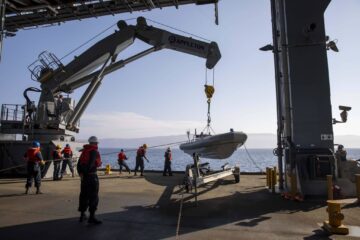US Navy press release
From March to April, Hershel “Woody” Williams completed maritime security operations with African partners from Sierra Leone, Cabo Verde and Senegal as well as members of the U.S. Navy, Coast Guard and Marine Corps.
In March, the joint U.S. and African maritime team interdicted an illegal, unregulated, and unreported (IUU) fishing vessel operating in Sierra Leone’s economic exclusive zone.
In April, as part of the African Maritime Law Enforcement Partnership (AMLEP), the joint team, led by Cabo Verde, worked in coordination with the Maritime Analysis and Operations Centre – Narcotics (MAOC-N), the International Police (INTERPOL), and Cabo Verde’s national Maritime Operations Center (COSMAR) to conduct a compliant boarding of a Brazilian-flagged fishing vessel, which led to the seizure of approximately 6,000 kilograms of suspected cocaine with an estimated street value of more than $350 million.

“The men and women that made this possible are a testament to our shared values and commitment to ensuring the safety, security, and freedom of navigation on the waters surrounding the African continent. I couldn’t be more proud of the professionalism and integration of the U.S. tri-maritime services, partner nations and other supporting organizations during our maritime security operations,” said Concannon. “These maritime security events show the world that our African partners are poised and ready to strike against illicit activity.”
Capt. Michael Concannon, Commanding Officer of USS Hershel “Woody” Williams
Hershel “Woody” Williams is the first warship permanently assigned to the U.S. Africa Command area of responsibility. The U.S. shares a common interest with African partner nations in ensuring security, safety and freedom of navigation on the waters surrounding the continent because these waters are critical for Africa’s prosperity and access to global markets.
The ESB ship class is a highly flexible platform that may be used across a broad range of military operations. Acting as a mobile sea base, they are part of the critical access infrastructure that supports the deployment of forces and supplies to support missions assigned.






